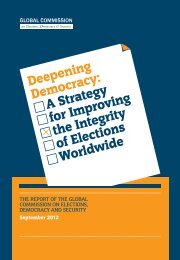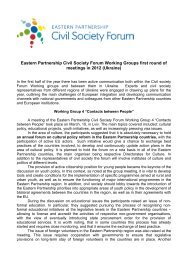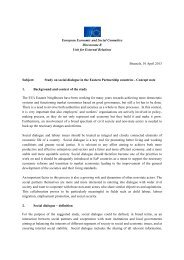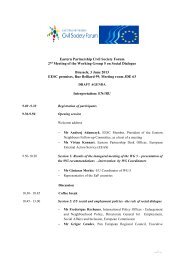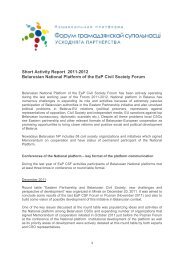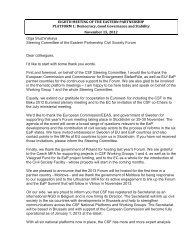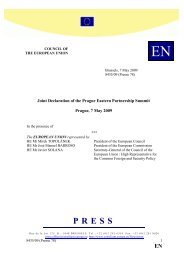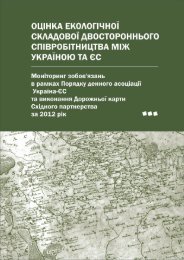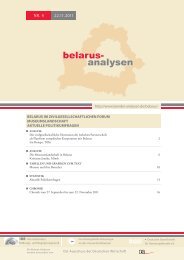Non-formal education - Eastern Partnership Civil Society Forum
Non-formal education - Eastern Partnership Civil Society Forum
Non-formal education - Eastern Partnership Civil Society Forum
Create successful ePaper yourself
Turn your PDF publications into a flip-book with our unique Google optimized e-Paper software.
Liliana Postan<br />
NON-FORMAL EDUCATION IN THE REPUBLIC OF MOLDOVA (2012):<br />
STATUS AND PROBLEMS<br />
The post-modern paradigm of the modern study of phenomena and relations contributes to the<br />
creation of platforms for self-expression and various in<strong>formal</strong> forms of organization and activityin the<br />
Republic of Moldova.<br />
The term “non-<strong>formal</strong>”, which is used more often in the system of <strong>education</strong>, has no clear definition.<br />
However, it is obvious that the “non-<strong>formal</strong> <strong>education</strong>” and “non-<strong>formal</strong> sector” saysabout reducing of<br />
government interference into social relations, including <strong>education</strong>, strengthening participatory functions<br />
of society and social responsibility and business interests.<br />
<strong>Society</strong> perceives ambiguously non-<strong>formal</strong> forms of organization of modern processes. In traditional<br />
societies, which the Republic of Moldovais, there remains paternalistic attitude to the state, and the<br />
level of public confidence in state is higher than in other institutions of society.<br />
Creation of civil society and the development of civic participation in Moldova are active processes<br />
for more than two decades of independence and self-determination of the country. In Moldova, the<br />
Ministry of Justice 39 registered about 6,810 non-governmental organizationsat the national level, as well<br />
as more than 1,400 NGOs registered at the local level. Recent studies related to the activities of civil<br />
society are 8200 officially registered NGOs 40 , among which 30% are active.<br />
<strong>Civil</strong> society organizations in Moldova are about 1.9 associations per 1,000 residents, more than<br />
in Ukraine (1.2), and Russia (1.6), but significantly lower than in other Western European countries<br />
– Romania (2.9), Macedonia (5.6), Hungary (6.6), and Herzegovina (9.6). These approximate figures<br />
have been calculated based on the 2010 NGO Sustainability Index 42 .<br />
Almost half of the civil society organizations involved in social and <strong>education</strong>al activitiesin Moldova.<br />
One in ten non-governmental organization dealing with human rights, 7.4% of NGOs – Youth, 6.5%<br />
– environmental problems, 4.3% – the opportunities of economic development, 3.4% – the problems of<br />
mass-media, etc. Important role is given to the problems of a communitarian development.<br />
The target groups of NGOs are all categories of people, but still, most of the activities of the NGOs<br />
(60.3%) are focused on the <strong>education</strong> of children and youth. Problems of people of middle and advanced<br />
age and professional groups interest respectively 17.8% and 17.0% of NGOs. 4.6% of organizations<br />
are involved in womenproblems.<br />
Every tenth NGO aims at assisting the institutions of the public sector-pits in solving everyday<br />
problems of communities (community organization, mobilization of citizens, the development of<br />
volunteering, collecting funds from the public for the realization of projects of social and economic<br />
development, etc.); also one of ten organizations deals with problems of people in the area of social<br />
risk, and 7.8% of the organizations are resource organization for the development of the civil sector,<br />
7.8% – representing the concerns and interests of all groups of the population.<br />
The level of development in the country areas of adult <strong>education</strong> is another important factor in<br />
the interpretation and development of non-<strong>formal</strong> <strong>education</strong>. Unfortunately, it is necessary to note the<br />
relatively recent interest in the various institutions of society and the state to the non-<strong>formal</strong> sector of<br />
adult <strong>education</strong>.<br />
39<br />
Реестр НПО Министерство Юстиции РМ. http://rson.justice.md/organizations.<br />
40<br />
http://www.fhi360.md/files/Raportul_Studiu_de_Transparenta_si_durabilitatea_ONG_Final.pdf<br />
41<br />
http://www.usaid.gov/locations/europe_eurasia/dem_gov/ngoindex/2010/complete_document.pdf<br />
64




